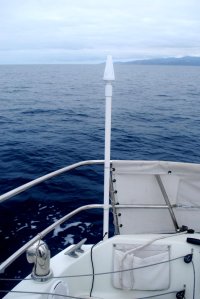Well, not knowing what to do I slowly, expensively did all options:
GPIRB (GPS EPIRB) -- this I trust and recommend; floats, lasts/big battery. You can throw it in the water and jump in after it. Or whatever.
GPS PLB: -- not sure this was worth it. Got it in package with GPIRB. Nothing wrong with it, but:
1. Doesn't auto-deploy. Maybe NY is warmer, but out here (bay area), I don't think it would be that easy to turn on, especially if attached to the now-huge-inflated-bladder of a spinlock or whatever.
2. Further, if you take the US Sailing safety at sea course (which I thought was well worth the time/money) it will rapidly become clear that the cold water immersion shock will make all that harder. Plus the rescue response to a PLB will be well over 30 min, and survival out here due to cold (not even assuming bad waves) is not great past an hour or so, so they say. But they'll know where your body is.
3. Will that antenna really be out of the water far enough to work? Hmm... maybe not.
4. I guess it is backup for my GPIRB...
AIS PLB (MOB1) -- Well, I got one... and have it on the inflatable harness vest. Pro: it auto-deploys. Con: turns out, in the US you are not allowed to program it to do an all-ships-DSC-distress call. Makes sense: too many false alarms I'm sure. But... that means the thing only calls ?!? your own vessel's MMSI. As if they didn't already know you were gone (or you were singlehanding? Bummer). You can do all-ships by pushing the right button while in the water... which you won't be able to see since it will be on the other side of that huge inflated bladder. And the cold shock... I have no confidence that I can do it right in a pinch. Antenna doubts when floating in the water too (certainly rough water) match the GPS PLB
--> The major pro of an AIS unit is that when the helicopter or boat comes for you, they can home in on it, unlike a GPS PLB. And this one, if anyone is coming, and if the antenna works, will be going even after you pass out. Not long range -- AIS is line-of-sight I expect, vs. satellite PLB.
Standard Horizon HX890 handheld VHF with DSC -- oh, yeah... been wearing this all along, and... it has a bigger batter, more capability, and EASY all-ships DSC distress call. And it was cheaper by far than any other option mentioned. Westmarine actually told me to do that, despite my preparing to buy the MOB1, but I didn't listen.
Take home, IMHO:
- GPIRB: of course.
- GPS PLB: seems like a waste but since I own it, I wear it (on my non-inflatable vest, along with the handheld VHF)
- AIS PLB: jury's out, but I wear it anyway... well, I wear it when wearing the harness/inflatable. Along with the handheld VHF...
- Handheld VHF with DSC -- will always wear this, have most confidence I can make it work, all ships DSC the second you flip that easy-to-find-even-by-finger red cover open. And cheapest by far. And a GPS VHF... just plain handy. I tend to think everyone should have one even if you're not using it for MOB-type safety.
I will be getting some sort of satellite phone (InReach or something) -- been listening to the USCG on Ch16 trying to deal with people offshore around here whose cellphones have no reception -- what an unnecessary mess at the worst time. Garmin, here I come. Still have to do my homework on which one of those to get, though...
Good luck with your choice(s).

